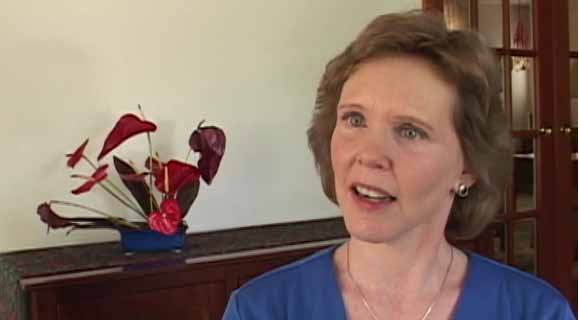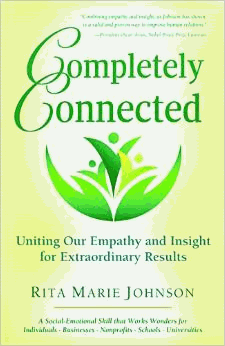Rita Marie Johnson
on Empathy http://bit.ly/fOqQUJ
An interview with Rita Marie
Johnson, founder of the Rasur Foundation and BePeace, talking about the
nature and importance of empathy. Videotaped 2010-05-26 in Concord,
California. For more, visit the
Rasur Foundation and
Academy for
Peace Costa Rica Rita Marie Johnson on Empathy - Empathy Documentary Project from Edwin Rutsch on Vimeo .
Initial Interview Outline
Introduction
founding director of the Rasur
Foundation
teach a practice called BePeace in Costa
Rica
quest to embody peace in a consistent
way
returning to the United States to be of
service to work on peace
How does empathy inform your work?
empathy is at the heart of BePeace
Coherence - to feel peace we need inner
order
how to feel peace and then how to speak
peace
need to put ourselves in the shoes of
others
we teach how to guess the feelings and
needs of the others
from he empathic connection compassion
evolves
How did your empathy evolve over the arch
of your life?
the value in our family was
responsibility - it was not about connection
my US culture was about efficient,
create the most is a short time
I heard the Costa Rica had no army
I went to learn from them and contribute
the primary values there is about
connection
people talk to each other
different than the US
worked at United Nations - models of
conflict resolution
University of Peace
Introduced to Nonviolent Communications
and Marshall Rosenberg
empathy was at the heart of the model
the universal needs
are in me and all human beings
found an empathic language
Was that the first time you used the word
empathy?
I knew of the word but learned how to do
it.
At the age of 10 I wanted to work for
peace.
it was the 4th of July
It was evening and I took a walk
I saw the sunset and I was filled with
peace and my heart opened
my inner voice said 'you will work for
peace'
I gave my sparklers away to my brother
the beauty of the peace
my country stands for freedom
and my country can also stand for peace
I want to bring back the know-how of
peace
freedom needs peace to be just
America could be a place of empathy?
empathy is under the surface that needs
to be expressed
BePeace hubs to promote and practice
empathy in the schools
when we are able to practice empathy
will reduce bullying, suicides, etc
every will feel they belong to one
another
delicious feeling of
A sense of inclusion?
How can we build a culture of empathy?
In Costa Rica we initiated a ministry of
peace
Create a alliance of peace organizations
everyone call learn the practice of
empathy and peace
we have a national working model of
peace
we need peace infrastructure
How will your work continue here in
America?
teach empathy courses in collages for
teachers
pass it on to other students
train leaders
one idea is to teach presidents and
their families
Obama has talked about empathy, what is
your impression?
warms my heart
he speaks to the empathy deficit
we know what to do, we have the know how
coherence - HeartMath - and ordered path
between hearth and head
we need to feel empathy in our hearts
as we embody peace we affect others
we project an energy field of peace
sending out a tsunami of peace
come form empathy and a desire to
connect
we can touch people who feel fear
without language
Talking about presence?
when we are in coherence we are feeling
presence
we not not always in peace of presence
we can come back faster and faster
we have the how to
Any other stories of connection and
empathy?
my first empathy was with Sura Hart
she came to teach empathy and Nonviolent
Communication
I shared a personal difficulty with her,
she heard me in a connecting way
I got clear and made a big change in my
life
she helped me to see how my strategy of
wanting to contribute wasn't working
Any other milestones in learning about
empathy?
a trainer wanted a certain strategy
got attached to the strategy - the
mediation was difficult
the trainer realized something
we have to stay connected
that's what empathy is all about, it's
about staying connected
out of the connection, a strategy will
emerge
the outcome needs to be connection
Any more stories?
one student was unsettled
I observed this
we use bio feedback - we coach them into
peace
at the end of the day I asked if he had
conflict
yes, he had pulled a girl by her hair
I gave empathy, he had failed many
examines
he felt he would never amount to
anything
feelings of needing belonging and
connection, loneliness
a tear came down his cheek,
I asked, what will you do the next time
you have a challenge?
it was an empathetic light bulb for him
these little experiences go deep and
change us
Sounds like you would like to replicate
that experience with all children?
A metaphor of empathy?
empathy is like traveling down a
beautiful path to a friends house
I arrive at my finds house and we go
into a hot tub
we are both individual
it's the path and destination
it's the warm feeling
What is a metaphor of the opposite?
Dialogue between the the two paths?
out of hut tub talking to the soldiers
give them empathy, what are their needs?
what does it feel like
help them get connected with their
compassion
get to a place of mediation
meet on the road
transform the road so everyone can share
to build a culture of empathy
What questions do you want to still
explore about empathy?
a reach study
putting a name on an angry face
measuring the amygdala
placing a name to an angry face versus
naming an emotion
test for the needs - what happens to the
amygdala when we guess the needs
Conclusion?
people want to make peace
with the genius of NVC and Heartmath
we know how to achieve a feeling of
peace
I'm thrilled to have the how to
We have the way to do it
it's not an unattainable air fairy
concept
any human being can do it
it grounded in who we are as humans,
science and experience
we can achieve peace on earth
Completely Connected:
Uniting Our Empathy and Insight for Extraordinary Results







